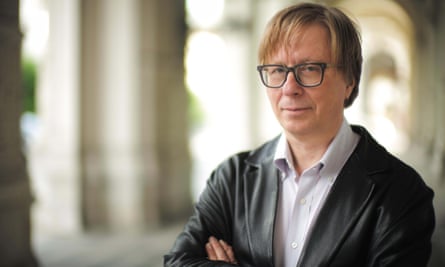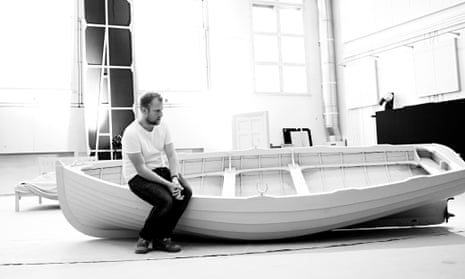In the midst of life we are in death. That old proverb could be an accurate precis of Georg Friedrich Haas’s new opera Morgen und Abend. Based on a novel by the Norwegian writer Jon Fosse, the piece has its world premiere at London’s Royal Opera House on 13 November. Like many of the Austrian composer’s works, this opera confronts existential questions. It charts a day in the life (and the life in a day) of a fisherman called Johannes (sung by German baritone Christoph Pohl), who comes to realise that he is, in fact, already dead.
Stark polarities are Haas’s thing. “We live between contrasts,” he says, “between happiness and unhappiness, between pain and joyful feelings about desire and fulfilling.” Born in Graz in 1953, Haas now feels more at home in New York, where he lives with his wife, the self-styled “submissive Scheherazade” Mollena. While she provides a source of joy, made manifest in the works Haas has recently dedicated to her, a restlessness also runs through his music.
Like many of his compatriots, Haas has been shocked by the “absolutely terrible and painful” politics of his native Austria (though neither is he blind to the shortcomings of his adopted American home). One of his best-known works, in vain, was a response to the rise of the far-right Austrian Freedom Party, playing out in a mixture of glaring white light and pitch-blackness. Going a step further, Haas’s Third String Quartet is performed in complete darkness. Destabilising, dystopian, these and other penumbrous works introduced the contradictions and juxtapositions, as well as the meticulous lighting states, which now inform Morgen und Abend.
Haas’s obsession with light, both physical and metaphysical, derives from his experience of growing up in Austria’s most western province, on the border with Switzerland. “I don’t love those high mountains,” he says, “they steal the light; they are dangerous and cold.” Despite having distanced himself from his homeland’s landscapes and its politics, Haas still feels an enduring affinity with Austria. He has a “strong emotional connection” to the music of Mozart, Schubert and Mahler, as well as to the Second Viennese School (Schoenberg, Berg and Webern), with whom Haas has a direct link through one of his teachers, Friedrich Cerha. But alongside these totems of Austria’s past, Haas is just as likely to mention Charles Ives, John Luther Adams or Stanley Kubrick’s film version of The Shining when reflecting on his creative hinterland.
Such a diverse web of references is indicative of the breadth of what the German-speaking world would call Haas’s Klang. When seeking an English translation of the word, Haas finds “sound” too restrictive, insisting that any interpretation should reflect its “transcendental and metaphysical qualities”. Franz Schreker, another Austrian precursor, tried to capture these qualities in his opera Der ferne Klang – “a key piece of the 20th century”, according to Haas. Indeed, Schreker’s “distant sound” was what Haas first played to his students when he began teaching composition at Columbia University in 2013.
In attempting to describe Haas’s own music, commentators have tended to focus on its links with spectralism and the composer’s frequent use of microtones. While these are important facets, Haas reiterates Schoenberg’s claim that construction and emotionality cannot be viewed as opposites; they are aspects of the same thing. “I try to create a musical language that is not based on notated structures,” he says, “but only based on the perception of the sound.” He is wary of talking about consonance and dissonance in his scores. “I just don’t think there is a genuine desire for consonance,” he claims. “When we look at other musical cultures, there’s no interest in a simple major chord. They are all interested in vibrations.” Returning to the western tradition, he explains why orchestras have 16 first violins or why there are three strings for each individual note on the piano: “because we are fascinated by vibrations”. Grasping Haas’s interest in sound itself is vital to understanding his compositional processes.
Haas’s music parallels librettist Jon Fosse’s unembellished literary style, which eschews punctuation and frequently imitates urgent, unrefined noises. But it is the stark compression of Morning and Evening (now available in an English translation by Damion Searls) that really appealed to Haas. “I feel a deep connection to his kind of expressivity,” he says, “based on the reduction of situations. The people in his work do not suffer in the foreground; they suffer in their inner lives.” That kinship was first established in Haas and Fosse’s 2008 opera, Melancholia, giving rise to what the composer describes as their “ideal way of working”. “I say: ‘Please give me the text – I promise I will not change anything – and then leave me alone.’ I believe in that division of mediums; he is responsible for the words and I am responsible for the music. And this works because he is a great poet.”

Particularly powerful is the near-Joycean description of the moment of birth in Fosse’s Morning and Evening, providing the trigger for Haas’s opera and what he calls a “theatre of emotions”. The musical response to the fisherman Johannes’s troubled birth is typical. “We do not have a common musical language today. So if I want to be understood I have to use a very clear and simple language.” Haas portrays the birth with ululating strings and a wordless chorus repeatedly punctured by percussive assaults. “Being born is not sentimental harmony,” he says. “It is a brutal and terrible act. To die is the same.” And those passages when Johannes crosses the border into the world beyond are correspondingly intense. “The music is very loud and very high, a metaphysical sound,” Haas says. “This is a real experience and I must try and put that experience into music.” In its sonic force the opera’s finale seeks to achieve the transcendence that is crucial to Haas’s notion of the Klang.
Transmitting life’s events by emotional and authentic musical means is what drives Haas. “It is not important to please somebody,” he insists, “it is important to be honest. I am the audience. I am a human being. Those who listen are human beings. So if I can honestly love what I am doing, there will be somebody else who will love it, too.”

Comments (…)
Sign in or create your Guardian account to join the discussion